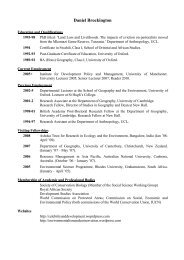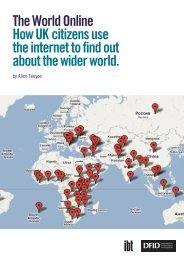World
Viewing the world - Full report
Viewing the world - Full report
- No tags were found...
Create successful ePaper yourself
Turn your PDF publications into a flip-book with our unique Google optimized e-Paper software.
I. RecommendationsIt could therefore be timely to consider the following:● Encouragement from senior commissioning editorsfor those producers interested in this area. Thiscould, for instance, take the form of creating anexperimental strand for films with a globalperspective, a showcase for new and arrestingapproaches. Commissioning editors could alsorecommend specific, existing slots or strands thatcould be targeted with global ideas. They couldencourage training seminars. There could even bea well-publicised cross-channel initiative, in whichcommissioners from various channels agree toaddress a more global agenda. If producers arebeing called on to be unpredictable and innovativeperhaps commissioning editors need to demonstratetheir support in surprising, new ways too.● A series of discussion and training seminars forproducers specifically designed to interest newtalent in this area and encourage some inventiveapproaches and angles. The seminars could include:global perspectives and networking for producers,how to access and develop good ideas abroad, thepracticalities of filming in developing countries, andquestions of narrative interest, production style andpackaging, critical analysis of previous output inthis area, and exchanges of ideas between newerproducers and ‘pioneers’ like John Pilger. Thesewould be geared to documentary and featureproducers, but separate sessions could be designedfor news producers, to encourage attractive,inventive approaches to the coverage ofdevelopment issues.● Research to explore additional indicators to ratingsfor measuring a programme’s worth. What otherways could be used to measure the value and impactof programming identified as important, but notdrawing the mass audience? The television andadvertising industries still gear themselves to massand volume, but in an increasingly fragmentedfuture this will become even more of an issue. It isalready an issue for the public service channels.● The encouragement of interaction between mediapolicymakers and producers in the UK, and thosefrom parts of the world beyond Europe and theUnited States, so that new areas of programmemakinginterest could be identified. Greater usecould perhaps be made of existing forums, such as●●●MIP, the Edinburgh International TV Festival orNewsworld, to expand discussion of programmecontent in the global age. Where commercial,technological or regulatory issues can predominate,an additional focus on global information flows,representation, or the tension between global andlocal cultural interests could perhaps stimulate thefresh approaches to international coverage that arecalled for in this report.An occasional, informal forum for British producersinterested in this field to meet, in response toproducers who feel there is little chance to exchangeideas now that few producers are in-house. It wouldprovide an opportunity to network, maintainbroader global perspectives and perhapsoccasionally encourage new productionpartnerships.Development funding to help with the researchingand planning of documentary and feature projects –or special news features – from developing countries.This would encourage producers to explore freshideas from less-covered parts of the world, andimprove the quality of these programme ideas. Thefunding process would need to be structured so thatfunds could be accessed either by commissioningeditors for particular projects, or producers whoseprojects have been ‘rubber-stamped’ by acommissioning editor. There needs to be somecertainty that funding goes to programmes with astrong chance of being commissioned.A bursary to enable mainstream British programmemakersto work in the television or film industry ofa developing country. This would give journalists orproducers the opportunity to have first-handknowledge of a country, experience the mediaindustries of another culture, make contacts andcollect programme ideas. It could build up a core ofproducers with heightened awareness ofinternational and multicultural issues, and withdirect access to ideas and fellow programme-makersaround the world.176 DFID – July 2000





